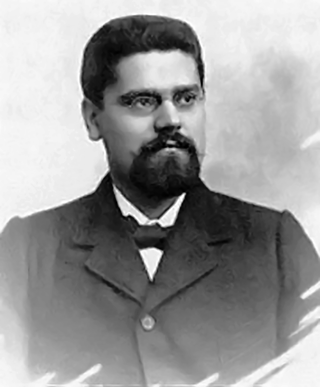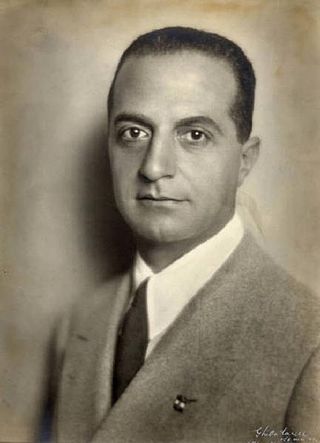
"The Doctrine of Fascism" is an essay attributed to Benito Mussolini. In truth, the first part of the essay, entitled "Idee Fondamentali", was written by the Italian philosopher Giovanni Gentile, while only the second part "Dottrina politica e sociale" is the work of Mussolini himself.

Actual idealism is a form of idealism, developed by Giovanni Gentile, that grew into a "grounded" idealism, contrasting the transcendental idealism of Immanuel Kant, and the absolute idealism of G. W. F. Hegel. To Gentile, who considered himself the "philosopher of fascism" while simultaneously describing himself as liberal and socialist, actualism was presented the sole remedy to philosophically preserving free agency, by making the act of thinking self-creative and, therefore, without any contingency and not in the potency of any other fact.

Giuseppe Bottai was an Italian journalist and member of the National Fascist Party of Benito Mussolini.

Edmondo Rossoni was a revolutionary syndicalist leader and an Italian fascist politician who became involved in the fascist syndicalist movement during Benito Mussolini's regime.
Class collaboration is a principle of social organization based upon the belief that the division of society into a hierarchy of social classes is a positive and essential aspect of civilization.
Squadrismo was the movement of squadre d'azione, the fascist militias that were organised outside the authority of the Italian state and led by local leaders called ras. The militia originally consisted of farmers and middle-class people, who created their own defence from revolutionary socialists. Squadrismo became an important asset for the rise of the National Fascist Party, led by Benito Mussolini, and systematically used violence to eliminate any political parties that were opposed to Italian Fascism.

The "Manifesto of Fascist Intellectuals", by the actualist philosopher Giovanni Gentile in 1925, formally established the political and ideologic foundations of Italian Fascism. It justifies the political violence of the Blackshirt paramilitaries of the National Fascist Party, in the revolutionary realisation of Italian Fascism as the authoritarian and totalitarian rėgime of Prime Minister Benito Mussolini, who ruled Italy as Il Duce, from 1922 to 1943.

Luigi Federzoni was an Italian nationalist and later Fascist politician.

Ugo Spirito was an Italian philosopher. At first a fascist political philosopher and subsequently an idealist thinker, he was also an academic and a university teacher.

Corporatism is a political system of interest representation and policymaking whereby corporate groups, such as agricultural, labour, military, business, scientific, or guild associations, come together on and negotiate contracts or policy on the basis of their common interests. The term is derived from the Latin corpus, or "body".

This is a list of words, terms, concepts, and slogans in the Italian language and Latin language which were specifically used in Fascist Italian monarchy and Italian Social Republic.

Sansepolcrismo is a term used to refer to the movement led by Benito Mussolini that preceded Fascism. The Sansepolcrismo takes its name from the rally organized by Mussolini at Piazza San Sepolcro in Milan on March 23, 1919, where he proclaimed the principles of Fasci Italiani di Combattimento, and then published them in Il Popolo d'Italia, on June 6, 1919, the newspaper he co-founded in November 1914 after leaving Avanti!

National syndicalism is a far-right adaptation of syndicalism within the broader agenda of integral nationalism. National syndicalism developed in France in the early 20th century, and then spread to Italy, Spain, and Portugal.

Fascist syndicalism was an Italian trade syndicate movement that rose out of the pre-World War II provenance of the revolutionary syndicalist movement led mostly by Edmondo Rossoni, Sergio Panunzio, Angelo Oliviero Olivetti, Michele Bianchi, Alceste De Ambris, Paolo Orano, Massimo Rocca, and Guido Pighetti, under the influence of Georges Sorel, who was considered the "'metaphysician' of syndicalism". The fascist syndicalists differed from other forms of fascism in that they generally favored class struggle, worker-controlled factories and hostility to industrialists, which lead historians to portray them as "leftist fascist idealists" who "differed radically from right fascists." Generally considered one of the more radical fascist syndicalists in Italy, Rossoni was the "leading exponent of fascist syndicalism", and sought to infuse nationalism with "class struggle".
Events from the year 1932 in Italy.
Corrado Govoni. was an Italian poet. His work dealt with modern urban representations, the states of memory, nostalgia, and longing, using an expressive and evocative style of writing.
Left-interventionism was the part of the progressive interventionist movement of various left-wing matrices, such as those of Mazzinian, social reformist, democratic socialist, dissident socialist, reformist socialist, and revolutionary socialist persuasions, that saw in the Great War the historical opportunity for the completion of unification of Italy, and for those who later became part of the Italian fascist movement, such as Benito Mussolini, as the palingenesis of the Italian political system and the organization of the economic, legal, and social system, and therefore a profound change.

Luciano Gottardi was an Italian Fascist politician and trade unionist.
Intransigent fascism or revolutionary fascism, in some respects analogous to so-called left-wing fascism, is a minority current of Italian fascism that, drawing on the integrity of the San Sepolcro manifesto and the movement's original ideals, those pre March on Rome, departed from the PNF and from the experience of the twenty-year period, during which in fact fascism was a reactionary regime of the extreme right, compromised with the Catholic Church, the Monarchy and conservative political forces, because of the common opposition to materialist Marxism and individualist liberalism.
António Júlio de Castro Fernandes GCC was a Portuguese economist, banker, politician and ideologue of corporatism.








